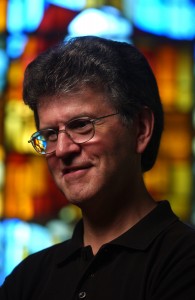
By Grace Gaddy
Reporter
Killing entire races of people, slaughtering men, women and children and showing no mercy: such topics don’t often make their way into the typical Bible bedtime story, but according to Dr. Philip Jenkins, these darker and often bloodier passages cannot be ignored.
Jenkins, a distinguished senior fellow at Baylor’s Institute for Studies of Religion and co-director for the historical studies of religion program, explored such passages in “Laying Down the Sword: Why We Can’t Ignore the Bible’s Violent Verses.”
Jenkins said he took on the project in the aftermath of 9/11.
“People looked at the Quran and said, ‘Muslims have all of these terrible violent passages in their book,’” Jenkins said. “If you actually look in the Bible, you find a lot of passages [and] a lot of verses that are just as violent, and in some cases more so.”
This spurred Jenkins to plunge deep into history to investigate how such passages came to be ignored, or in many instances, completely forgotten.
“They just don’t read them,” Jenkins said.
Today, many churches implement a preset list of biblical readings and sermons, which often skip over the blood-and-guts sections.
Jenkins said one could go to church every week for a year, and still not hear anything about them.
But peering back into the history books shows that this hasn’t always been the case.
Jenkins offered the Hebrew word “herem,” which he explained as “fight[ing] a war of absolute destruction, extermination, annihilation, and you leave no survivors.”
In 1 Samuel, for example, God punished King Saul for not wiping out every last Amalekite: men, women, children and animals.
“A lot of Christians and Jews through history have taken [such passages] and applied them to their own day,” Jenkins said. “So we get wars. For instance, when Protestants killed Catholics [and vice versa] based on those passages.”
The Rwandan genocide of 1994 also had killers defending their actions by citing the “those very bloody texts,” stories in Joshua and Deuteronomy, to justify their actions, he added.
Passages so extreme in nature must be looked at with care and consideration, he said.
“They’re really scary in some ways, and you try and reconcile them from what we know from the Bible, the mainstream of the Bible,” Jenkins said.
That is sometimes difficult to do. Perhaps this is why many have completely ignored them, he said.
Jenkins said that the question becomes “how do we deal with these verses today?”
These verses cannot be avoided as other foreign cultures and societies unfamiliar with Christianity come to examine the passages for the first time, Jenkins said.
He said he believes those who have questions will look to America for answers.
“It isn’t good to say, ‘Well, we just pretend they don’t exist,’” Jenkins said. “We can’t just pretend they’re not there. What we have to do is deal with them.”
So Jenkins wrote his book.
Jenkins said he believes to examine such matters correlates directly with Baylor’s commitment to faith and learning.
“Baylor’s whole mission is applying serious scholarship to issues of faith, and that’s what I’m trying to do,” Jenkins explained.
Ralph Wood, professor of theology and literature, praised Jenkins’ latest undertaking.
“Philip Jenkins is perhaps the most wide-ranging cultural critic of our time,” Wood said.
“His work is spread over virtually the whole of both western and eastern cultures. Nothing that Philip Jenkins writes is anything other than intelligent and provocative, and so I assume that this book will be the same,” he added.






